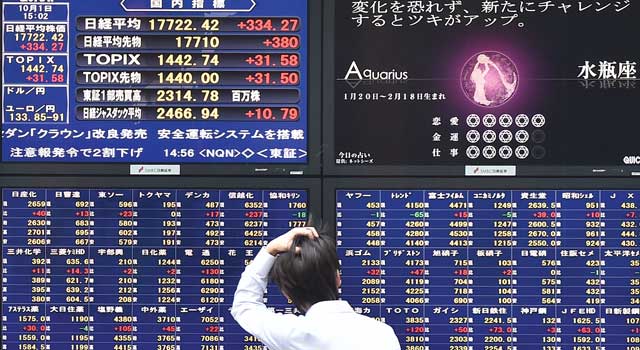Chinese capital flight continues. It was initially triggered by a crash in the capital markets. Bloomberg reports that China recently cracked the nation’s biggest “underground bank,” which handled 410 billion yuan ($64 billion) of illegal foreign-exchange transactions. The business online publication reported that more than 370 people were arrested, and also cited that the case brought the total for underground banking and money-laundering activities to 800 billion yuan since April.
The case, it was reported, highlights the nation’s struggle to control capital outflows even when Chinese citizens are officially limited to converting $50,000 equivalent of yuan per year. The publication estimated China’s capital outflows at a record $194 billion for September before it cooled off to $62 billion in October.
“The government wants to stem outflows and stabilize the yuan’s exchange rate, but the outflows cannot be stopped unless people change their expectation on yuan depreciation. Besides illegal banking operations, a lot of money is leaving the country by legal means,” Xi Junyang, a finance professor at Shanghai University of Finance & Economics, was quoted by Bloomberg.
Is Botswana well positioned to take in some of capital flowing out of China?
Moatlhodi Sebabole, a finance PhD candidate and economist at First National Bank Botswana (FNBB), said capital is constantly looking for better returns and that emerging economy markets provided just that. Sebabole was not too upbeat about a large chunk of the capital flowing into the Botswana Stock Exchange (BSE) citing the small size of the local bourse and lack of liquidity.
“The Botswana Stock Exchange is small and not ready for the kind of funds we’re talking about here. We need to do something about the liquidity position of the local bourse, it is dominated by institutional investors who buy and hold stock for long periods,” decried Sebabole.
However, Sebabole commended initiatives by the bourse like the Exchange Traded Funds (ETFs) where stocks from other markets are sold as a basket, or in some cases are tied to commodities like gold which is performing very well.
Thapelo Tsheole, Deputy Chief Executive Officer (DCEO) of the BSE said it was difficult to say where the capital was headed, but corroborated Sebabole that capital in its nature is always looking for better returns. “The capital will go to markets which offer better returns and save havens. Save havens here being gold and US dollar denominated investments,” he said.
Quizzed on strategies the BSE was implementing to attract some of the capital windfall, Tsheole responded that the BSE was attractive as it is. “It is the most attractive stock exchange in Sub Saharan Africa,” he emphasized, adding that they receive a lot of enquiries about their investments instruments from global investors. “Most of the enquiries we have converted into sales,” he said.
Asked if they have seen a lot of capital inflows from China in recent times, he responded; “The capital flowing out of China will not flow directly to Botswana. It may first go to investor home countries before flowing here, so it’s difficult to say if, say, an American invests heavily with us, the funds may have been recalled from China,” he said.
Letsebe Sejoe is CEO of the Botswana Investment and Trade Centre (BITC), a parastatal organization tasked with attracting Foreign Direct Investment into Botswana. This publication asked him if they were doing anything to take advantage of the Chinese capital flight.
“You will appreciate that all that capital that is flowing out of China was invested in portfolio investments like equities and bonds. Those investors, if they were to invest here would want to put their money in similar equities,” he responded.
However, Sejoe was quick to add that as an entity, they are aware that the Chinese are flush with cash and they are within the BITC’s radar of investors.
“We’re in talks with a number of Chinese investors to invest in ‘greenfield’ type of investments. Our talks are at an advanced stage with one Chinese investor who specializes in township development, others are looking to invest in hospitals, while others will invest in truck stops,” he said.
Tlotlo Ramalepa, an analyst with Motswedi Securities, responding to the question of where the capital leaving China was going, said it was difficult to tell. “It may go to markets with better returns, or stockbrokers may have decided to withdraw it from the Shanghai Stock Market, call it back and hold on to it in cash while they decide where next to invest it,” he said.
Asked if they have seen an influx of capital since the Chinese market crash, Ramalepa said there is a lot of interest by investors in Botswana.

